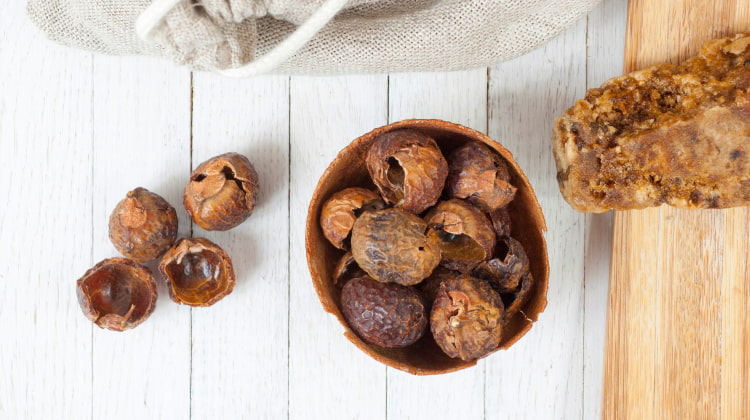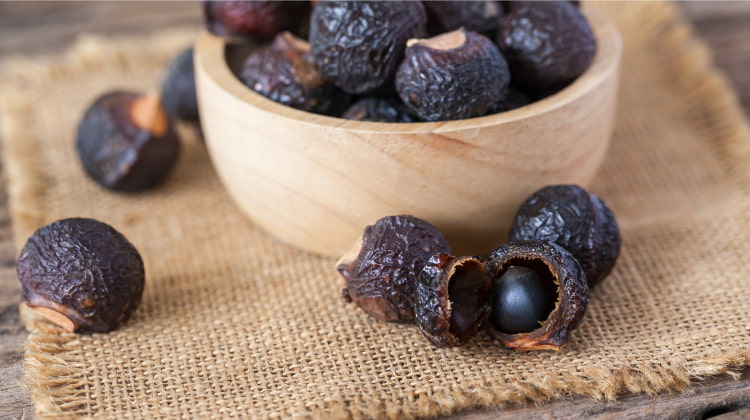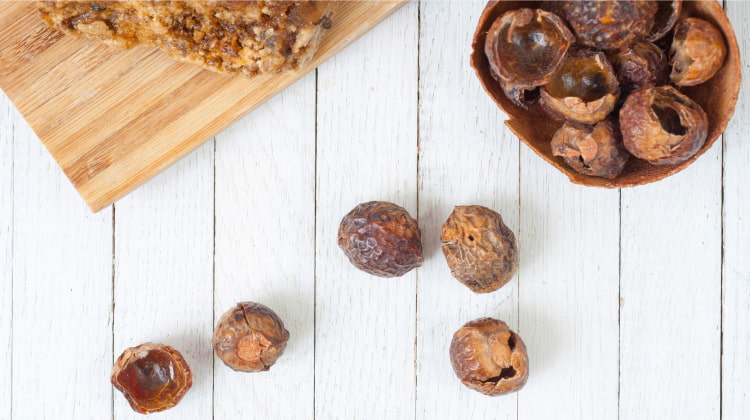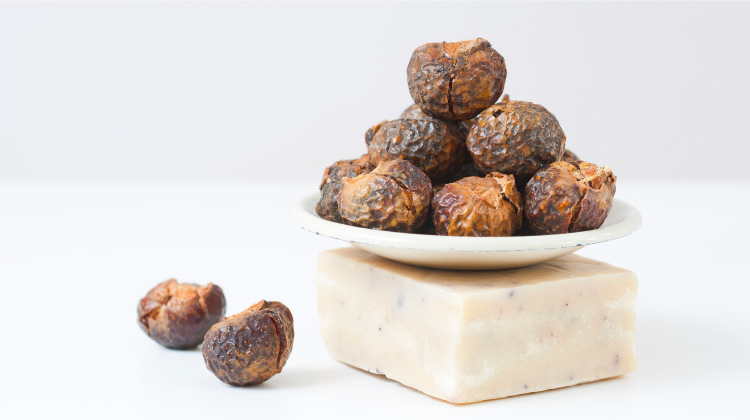
I'm sure many of you have gone through countless hair products in search of that perfect one that leaves your hair feeling fabulous and healthy. I know I have! I recently stumbled upon soap nuts and let me tell you, they have been a game-changer for my hair care routine. If you're curious about soap nuts and their potential benefits for hair care, you've come to the right place.
In this article, we'll explore what soap nuts (also known as Reetha) are, their impressive benefits for hair, how to use them, and any potential side effects you should be aware of. Oh, and I'll also share some DIY soapnut shampoo recipes that's super easy to whip up at home! So, let's dive into the world of soap nuts and see if they're the hair care solution you've been looking for.
What Is Soap Nut (Reetha)?
Have you ever heard of soap nuts, reetha, soapberries, or washing nuts? These small, spherical berries have been a go-to cleaning solution in India for centuries. They come from the Sapindus mukorossi tree, which grows in tropical regions like India, China, Japan, the Himalayas, and the mountainous areas between India and Nepal.
Now, don't let the name fool you – soap nuts aren't actual nuts! They're berries that contain a natural cleaning compound called saponin. When soap nuts meet water, saponin is released, creating a mild foam that's similar to soap. This makes them an excellent alternative to synthetic detergents(1) and other chemical-laden cleaning products, like those with sodium laureth sulfates (SLS).
Ayurveda has long praised soap nuts for their numerous hair and skin benefits. They're hypoallergenic, odorless, and gentle on fabrics, making them a safe choice for everyone. With regular use, soap nuts can give you healthy, shiny, lustrous hair and even-toned skin. You might come across various names for soap nuts, such as Reetha, Wash nut, Thali, Boondi Kottai, Kumkudukaya, Soapberry, and Dodani.
The versatility of soap nuts is truly impressive – you can use them for washing clothes, dishes, and even your body and hair. Soap nuts are great for shampoo, their natural antibacterial properties(2) make them perfect for those with sensitive skin or allergies. Plus, their sustainable nature makes soap nuts a must-have for an eco-friendly household.
9 Impressive Benefits of Soap Nuts for Hair

You might be wondering about the soap nuts’ benefits for hair and what makes them so wanted in the world of hair care. Long story short, their nutrient-rich composition and natural properties make them an ideal treatment for various hair types and conditions. Let's dig a little deeper into each of the impressive benefits of soapnuts for hair:
Packed with Vitamins
One of the things that makes soap nuts so amazing for hair is their rich vitamin content. They're loaded with Vitamins A, D, E, and K, which are essential for maintaining healthy hair. You see, these are all vitamins that:
- Add shine and smoothness to your hair, making it look more vibrant and full of life.
- Nourish and hydrate your hair from within, leaving it feeling soft and silky to the touch.
- Strengthen your hair, helping to prevent breakage and hair loss.
Antimicrobial, Antifungal, and Antibacterial Properties
Soap nuts have natural antimicrobial, antifungal, and antibacterial properties(3), which can help to:
- Cure scalp infections and prevent dandruff, keeping your scalp healthy and itch-free.
- Eliminate lice from the scalp, reducing the risk of re-infestation.
- Thoroughly cleanse your scalp and hair, removing dirt, excess oils, and product buildup without stripping away essential moisture.
Promote Hair Growth
The vitamins A and D found in soap nuts play a crucial role in promoting hair growth. They work by:
- Strengthening hair roots, reducing hair fall and breakage.
- Supporting sebum production, which nourishes and protects your hair, encouraging healthy growth.
Reduce Hair Fall
One of the most sought-after benefits of soap nuts is their ability to reduce hair fall. Using soapnut-based hair products regularly can:
- Promote hair growth by nourishing and strengthening the hair from the roots.
- Prevent hair loss by reducing breakage and maintaining overall hair health.

Tame Dry and Frizzy Hair
If you struggle with dry and frizzy hair, soap nuts can be a lifesaver. They help by:
- Conditioning your hair, locking in moisture and keeping it hydrated.
- Making your hair more manageable, so it's easier to style and maintain.
Detangle Hair
Tangled hair can be a nightmare, but soap nuts can come to the rescue by:
- Softening hair, which makes it easier to detangle and brush through.
- Reducing breakage caused by tugging and pulling on tangled hair.
Reduce Split Ends
Regularly using a reetha hair wash can have a noticeable impact on the health of your hair, specifically by:
- Reducing split ends and preventing further hair damage.
- Strengthening the hair shaft, making it more resistant to breakage.
Eco-friendly and Chemical-free
Aside from their hair benefits, soap nuts are also an eco-friendly and chemical-free alternative(4) to conventional hair products. They're:
- Naturally antifungal and antibacterial, keeping your scalp healthy without harsh chemicals.
- Free of SLS (Sodium Laureth Sulphate), a common ingredient in many hair products that can cause irritation and dryness.
- Environmentally friendly, reducing plastic usage and waste compared to traditional hair care products.
Soften Hair
One of the standout benefits of soap nuts is their ability to soften hair, especially when combined with a vinegar rinse or massaging oil before washing. The natural conditioning properties of soap nuts will leave your hair feeling soft, smooth, and manageable.
How to Use Soap Nuts for Hair
Using soap nuts for hair care is easier than you might think. They can be combined with other natural ingredients like amla, shikakai, yogurt, and multani mitti for hair nourishment, treatment, and growth. Here are some ways to incorporate reetha and other ingredients into your hair care routine:
Soapnut Shampoo
- Combine 30 grams of soapnut liquid soap, 350 grams of water, 2-3 drops of essential oil, and 1 teaspoon of baking soda (optional).
- Use the mixture like regular shampoo and rinse well.
- Use a mixture of apple cider vinegar and water to rinse and condition your hair.
Reetha Powder and Shikakai Powder Hair Treatment
- Mix ground reetha and shikakai powders with water to create a medium consistency paste.
- Apply to your scalp, massage in circular motions for 7-10 minutes, and rinse off with water.
Reetha Conditioner
- Soak 7-10 soap nuts (shells removed) in water overnight and strain the mixture.
- Apply it to your scalp and massage like shampoo, then wash off with water.
Reetha Hair Mask
- Mix reetha powder, multani mitti, amla powder, shikakai powder, and yogurt.
- Apply the hair pack from roots to tips, leave it on for 40 minutes to 1 hour, and rinse off with water.
Soapnut Hair Pack
- Mix 3 tablespoons of soapnut powder, 1 tablespoon of lemon juice, and 2 tablespoons of yogurt to form a paste.
- Apply it to your scalp and hair, let it dry, and wash it off with normal water.
Safety Tips for Using Soap Nuts on Hair

To ensure the best results and avoid any potential issues or side effects while using soap nuts on your hair, it's important to follow some safety tips:
Lather Expectations
Keep in mind that DIY soap nut shampoo won't foam and lather like store-bought liquid shampoos. However, this doesn't compromise its effectiveness. Embrace the different texture and focus on massaging your scalp and hair thoroughly with the soap nut solution.
Eye Caution
Soap nuts have insecticidal properties, so be careful not to let the solution come into contact with your eyes. If this happens, rinse your eyes thoroughly with water, and seek medical attention if irritation persists. To minimize the risk, consider wearing goggles or a headband to protect your eyes while applying the soap nut solution.
Allergic Reactions
While soap nuts are generally safe and hypoallergenic, some individuals may experience allergic reactions. If you notice rashes, itching, or any other symptoms after using soap nuts, discontinue their use immediately and consult a doctor. To prevent potential reactions, consider doing a patch test by applying a small amount of the soap nut solution to your skin and observing for any signs of irritation.
Storage and Usage
Use your prepared soap nut shampoo within 72 hours. If not, discard it. If the mixture has an odd smell or appears discolored, it may have gone bad, so prepare a fresh batch.
Quality and Quantity
Always choose high-quality soap nuts and use them in specified quantities to prevent wastage and ensure the best results. Store soap nuts in a cool, dry, and dark place to maintain their freshness and potency.
Nourishing Oils
If you find your hair feeling dry after using soap nut shampoo, apply a few drops of nourishing oils such as coconut oil, jojoba oil, or sweet almond oil to the ends of your hair. It's best to do this at night, allowing the oil to absorb overnight. In the morning, your hair should feel clean and nourished.
Additional Hair Treatments
Enhance your hair care routine by incorporating other natural hair treatments alongside soap nuts. Consider using a natural hair rinse, like apple cider vinegar or chamomile tea, or create a hair mask by combining soap nut powder with other nourishing ingredients, such as honey, banana, or avocado.
So, Are Soap Nuts Good for Hair?
In conclusion, yes, soap nuts are an excellent choice for hair care due to their numerous benefits and eco-friendly nature. By following the proper steps and safety guidelines, you can take advantage of their impressive properties, such as reduced hair fall, improved hair growth, and elimination of scalp issues.
However, as with any new hair care product, it's essential to perform a patch test and monitor the results. Overall, soap nuts are a fantastic natural hair care option that deserves a place in your routine, benefiting both your hair and the environment.
Frequently Asked Questions
Can you use soap nuts for hair?
Yes, soap nuts can be used for hair care. They're a natural, eco-friendly alternative to synthetic shampoos, offering benefits like improved hair growth, reduced hair fall, and relief from scalp issues due to their antimicrobial and antifungal properties.
What are disadvantages of soap nuts for hair?
The main disadvantages include potential allergic reactions, less foaming compared to regular shampoos, and possible dryness if not used correctly or followed with a suitable conditioning treatment.
Does soap nuts dry out hair?
Soap nuts can dry out hair if used excessively or without proper conditioning. It's essential to follow up with a natural conditioner, such as a vinegar rinse or a nourishing oil, to maintain hair's moisture balance.
Can I use soap nuts to wash my hair everyday?
While soap nuts are gentle, daily use could lead to dryness. It's recommended to wash your hair with soap nuts every 2-3 days, allowing your hair's natural oils to maintain a healthy balance.
How to use soap nuts for hair wash?
Create a soap nut shampoo by boiling 7-10 soap nuts with water, leaving overnight, and straining the mixture. Apply the liquid to your scalp, massage like shampoo, and rinse thoroughly with water.
References
1. Panda, A., Kumar, A., Mishra, S. and Mohapatra, S.S. (2020). Soapnut: A replacement of synthetic surfactant for cosmetic and biomedical applications. Sustainable Chemistry and Pharmacy, {online} 17, p.100297. doi:https://doi.org/10.1016/j.scp.2020.100297.
2. Kora, Aruna Jyothi (2014). Antibacterial and antioxidant activities of aqueous extract of soapnuts (Sapindus mukorossi). CURRENT TRENDS IN BIOTECHNOLOGY AND PHARMACY, {online} 14(4), pp.388–395. Available at: https://www.indianjournals.com/ijor.aspx?target=ijor:ctbp&volume=14&issue=4&article=003.
3. Merve Deniz Köse and Oguz Bayraktar (2016). Extraction of Saponins from Soapnut (Sapindus Mukorossi) and Their Antimicrobial Properties. {online} ResearchGate. Available at: https://www.researchgate.net/publication/304377875_Extraction_of_Saponins_from_Soapnut_Sapindus_Mukorossi_and_Their_Antimicrobial_Properties.
4. Devi, V. M., Rajakohila, M., Syndia, L. A. M., Prasad, P. N., & Ariharan, V. N. (2012). Multifacetious uses of soapnut tree-a mini review. Research Journal of Pharmaceutical, Biological and Chemical Sciences, {online} 3(1), 420-424. Available at: http://rjpbcs.com/pdf/2012_3(1)/53.pdf.

.jpg)
.jpg)
.jpg)
.jpg)
.jpg)
.jpg)
.jpg)
.jpg)
.jpg)
.jpg)